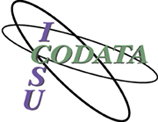International Council for Science : Committee on Data for Science and Technology
![]()
< home > < blog > < newsletter > < discussion list > < data science journal > < contact > < members area >
C O D A T A
Who are we?
CODATA, the Committee on Data for Science and Technology, is an interdisciplinary Scientific Committee of the International Council for Science (ICSU), was established 40 years ago.CODATA works to improve the quality, reliability, management and accessibility of data of importance to all fields of science and technology. CODATA is a resource that provides scientists and engineers with access to international data activities for increased awareness, direct cooperation and new knowledge. CODATA was established in 1966 by ICSU to promote and encourage, on a world-wide basis, the compilation, evaluation and dissemination of reliable numerical data of importance to science and technology.
CODATA is concerned with all types of data resulting from experimental measurements, observations and calculations in every field of science and technology, including the physical sciences, biology, geology, astronomy, engineering, environmental science, ecology and others. Particular emphasis is given to data management problems common to different disciplines and to data used outside the field in which they were generated.
What are our objectives?
- The improvement of the quality and accessibility of data, as well as the methods by which data are acquired, managed, analysed and evaluated, with a particular emphasis on developing countries
- The facilitation of international cooperation among those collecting, organizing and using data
- The promotion of an increased awareness in the scientific and technical community of the importance of these activities
- The consideration of data access and intellectual property issues
In short, the reason for CODATA is to help foster and advance science and technology through developing and sharing knowledge about data and the activities that work with data.
How do we
achieve these objectives?
CODATA uses many mechanisms in its ongoing effort to reach these objectives.
These are:
- Task Groups
- Working Groups
- National Member activities
- Conferences
- Workshops
- Publications
- Co-operation with other organisations on common interests
The achievement of our objectives is an ongoing goal. Methods used to reach them are continually improving and evolving. It is important to emphasise that data related activities are not confined to a specific scientific discipline but they relate to data activities in every area of science and technology, from biology to global change, from the physical sciences to engineering. CODATA reaches out to different disciplines through its growing number of members within the CODATA family, each outlining their different data needs, sharing knowledge about their respective data activities and identifying common areas of interest.
CODATA has four primary activities, all in support of its fundamental aim of fostering worldwide cooperation in scientific and technical data:
-
Sponsorship of a Biennial CODATA International Conference on data, which attracts approximately 300 data specialists from around the world.
-
Specialist meetings of scientific data experts, which address issues specific to one discipline or topic.
-
Publications on data handling, data compilation, surveys of data activities, and conference proceedings.
-
Sponsorship of Task Groups, Working Groups, Commissions and other groups addressing specific data issues, such as:
- Coordination of multinational data project
- Establishment of format standards to promote data exchange, sharing, and compatibility
- Guidelines to presentation of data in the primary literature or archival databanks
- Supplying information on sources of reliable data
- Education and training
- Preparation of key data sets for which consistent international use is desirable
- Organization of conferences and workshop
The national committees of CODATA often organize data activities on a national level. Much of the most important work of CODATA, however, lies outside its formal activities in its providing a milieu in which data experts from different countries can interact, cooperate directly, develop bilateral collaborations outside of CODATA, and exchange ideas and knowledge.
A major driving force in the establishment of CODATA was the fact that the management of scientific data could no longer be left to the ad hoc efforts of a few dedicated individuals. The rapid expansion of scientific research which had occurred continuously since the end of World War II, brought with it a corresponding expansion in the amount of data generated. If this investment in research is to be fully utilized, better mechanisms are needed to evaluate, store, retrieve, and disseminate the data. While national organizations carry out some of these functions, CODATA is the international umbrella organization which encourages, coordinates, and tries to avoid duplication of such efforts.
CODATA is open to new projects, especially in this time of increasing importance of data because of computer-based modeling and the Internet. Today more and more data sources of unknown quality and origin are becoming easily available, via the World Wide Web. CODATA provides a home for international data experts needing to address data quality and data access issues to turn the Information Revolution into a positive force for the future. Today's data become the products and processes of tomorrow. CODATA is prepared to help science and technology achieve a better tomorrow through better data today.
Working to improve the quality, reliability, management and accessibility of Data for Science and Technology
| home
| about
| codata membership
| resources
| task and working groups
|
| archives | newsletter | contact
| members area |
| ![]() | RSS Feed subscription instructions |
| RSS Feed subscription instructions |
